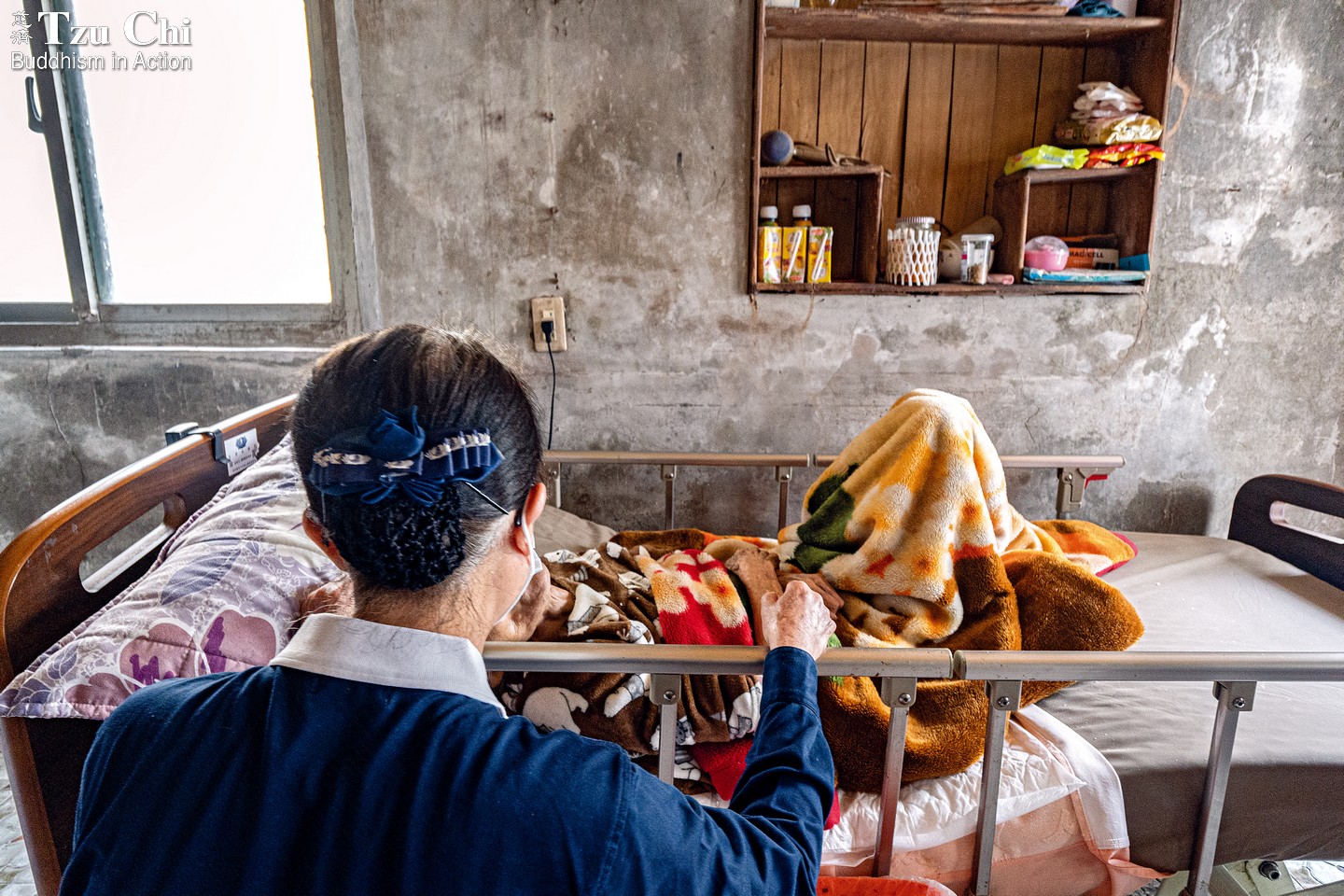By Hong Jing-jing
Translated by Wu Hsiao-ting
Photos by Hsiao Yiu-hwa
Empathizing with the inner agony and suffering of individuals with mental illness, Huang Xiu-yan extends a helping hand, striving to foster positive change.

Tzu Chi volunteer Huang Xiu-yan talks to an older woman who struggles with a mental illness, along with hearing and visual impairments.
“I knew the nursing home was trying to find me via the public speaker system, but I was busy talking to the ants,” said Weng.
“You spent so much time talking to the ants, I waited for you for so long!” responded Huang Xiu-yan (黃秀燕).
Weng, battling schizophrenia, experiences absurd and bizarre delusions from time to time. Huang, a Tzu Chi volunteer living in Keelung, northern Taiwan, has been caring for him for 30 years. Recognizing that he was having an episode again, she responded with a calm and understanding demeanor.
Huang vividly remembers the first time she met Weng, in 1993. His head was wrapped in a plaster used for burn patients, leaving only his eyes visible. Not long after completing his compulsory military service, distressing changes in his mental state emerged. He was plagued by hallucinations and delusions, in a state of deep despondency. He even contemplated ending his life. Tragically, during an attempted gas suicide, an unexpected explosion inflicted extensive burns all over his body, distorting his face. He had to undergo more than 20 surgeries to regain the use of his hands.
Huang had been a certified Tzu Chi volunteer for just over a year when she began visiting Weng with other volunteers. It was her first experience with individuals grappling with mental illness. She watched how the more experienced volunteers gently and kindly encouraged the young man. “At that time, he was truly feeling hopeless and despaired,” she recalled, “but thanks to the genuine support from the volunteers, he eventually found the courage to face the world.”
When Weng was a little child, his parents divorced, and he was raised by his father. After the gas explosion destroyed their home, the father and son were forced to rent a place to live. His father resigned from his job at a factory warehouse to care for Weng. Tzu Chi volunteers promptly intervened, providing care and financial support for their living expenses and medical fees.
“Weng doesn’t exhibit any violent tendencies,” explained Huang. “When he takes his medication, he can engage in meaningful conversations with us.” After his father passed away, he lived alone, and Huang took over from the more experienced volunteers to help ensure his continuous care and support.
Building trust through empathy
“Interacting with individuals with mental illness, just like any other care recipient, requires genuine sincerity in our approach,” said Huang. She has offered compassion and understanding to Weng for 30 years now. When he broke his leg in a car accident, she diligently delivered three meals to him almost every day during his recovery. When he moved into a nursing home in Taoyuan, she and other volunteers made regular monthly trips from Keelung to that city, taking him out to bookstores or for meals, and attending Tzu Chi’s year-end banquets for the foundation’s care recipients together. When he suffered from a severe case of scabies all over his body during a stay in a nursing home in Yilan, Huang accompanied him to seek medical treatment and meticulously disinfected all his clothes by boiling them.
Weng has no living family members, and Huang is the only person he trusts. On one occasion, during a severe bout of schizophrenia, Weng wandered aimlessly in his community and spoke incoherently, causing distress among other residents. His landlord urgently contacted Huang, seeking her assistance in handling the situation.
Weng’s gaze was unfocused when Huang found him, but he still recognized her. She asked him, “Are you feeling very uncomfortable? Are you being greatly disturbed?” Weng nodded, but immediately his speech became incoherent again. “Shall I take you to see the doctor?” Huang continued. “You might feel better.” Weng nodded his consent.
Huang stressed the importance that individuals with mental illness adhere to their medication schedule, as discontinuing medication can lead to relapses. Fortunately, Weng does not pose harm to others when he has a bout; his main symptoms are mumbling to himself and having a distant gaze.
Even so, Huang’s journey of providing support for him has been filled with incidents that required her vigilance. One time, during a cold snap and heavy rain in Keelung, Weng went missing from the nursing home he was residing at in that city. Huang was concerned that he might venture into the mountains, making it difficult to find him. Thankfully, that didn’t happen. The next day, the police found him naked, holding an umbrella, directing traffic on a street. “He explained his behavior by saying that a deity was descending from heaven, and he needed to remove his clothes to receive the deity,” Huang said. She understood that she could avoid triggering his emotions as long as she empathized with him without dismissing his beliefs. “I won’t ever say to him that he is abnormal. I just smiled and replied, ‘You are truly devout!’” she recalled.
Weng currently lives in a nursing home in Yuli, Hualien, which is quite a distance from Huang’s home in Keelung. Despite their geographical separation, Huang sends him food, copies of Tzu Chi Monthly, Buddhist scriptures, and other supplies every month. Weng can truly feel the sincere care from her, as demonstrated during the COVID-19 pandemic: he was the first person to call and express concern for Huang. He was genuinely worried about her well-being, advising her to wear masks properly, wash her hands with soap, and avoid crowded places. “He writes me letters too, expressing his gratitude for the care I’ve provided him,” Huang said, looking gratified.

Huang Xiu-yan attentively listens while a family member of a person with a mental illness shares her challenges of being a caregiver. Huang also helps such family members seek resources to alleviate their excessive physical and emotional burdens.
Ailing minds
“Not every person with a mental illness is the same,” emphasized Huang. She stressed that when caring for people with mental conditions, one must always be attentive to their words and facial expressions. If they appear kind and amiable, it indicates that their inner states are relatively stable. However, if they are experiencing an episode, they may have negative and chaotic delusions that are difficult for others to grasp, requiring careful handling.
Huang recalled a situation when she and other volunteers arrived at a new care recipient’s home to visit. When they rang the doorbell, it inadvertently startled the care recipient, causing him to break into a furious outburst at the volunteers outside the door that lasted for half an hour. Undeterred, Huang astutely peered through the partially open door and noticed a tea set cabinet inside the house. “You seem to be skilled in brewing tea,” she said to the man, trying to engage him in conversation. Eventually, the person calmed down and welcomed Huang and the other volunteers into his home.
Over her many years of extending care, Huang has also encountered individuals who exhibit violent behavior. “One time, a man went berserk and was ready to attack us,” she said. “We had to make a hasty retreat.” She emphasized that in such situations, instead of continuing to provide care, it is essential to involve government agencies for assistance, enforce compulsory treatment for the individuals, and find suitable institutions in which they can be placed.
Huang pointed out that just as the physical body can fall ill, the mind can also experience illness. When one is sick, seeking professional treatment is essential. “In assisting individuals with mental disorders,” she said, “the primary focus should be on helping them seek medical care, followed by connecting them with relevant social welfare resources.”
In her efforts to aid individuals with mental conditions, Huang also offers her care to their family members. She has observed family members who grapple with the overwhelming challenge of “coexisting with the illness,” experiencing emotional and mental anguish as they try to support their loved ones amidst the complexities of the condition.
She once helped an 84-year-old woman with a mental illness. She also suffered from severe hearing impairment and blindness in both eyes. Regardless of how loudly Huang shouted, the woman couldn’t hear her. “Who are you? What are you saying?” the woman asked. “I am from Tzu Chi,” Huang replied. “What did you say? Who are you?” the woman asked again.
Huang and other volunteers became aware of the woman through a neighborhood chief. The woman’s home was overflowing with garbage, inside and out, prompting the chief to seek help from Tzu Chi. Approximately 60 volunteers came to assist with the cleanup. The elderly woman was extremely emaciated, confined to her bed, suffering with bedsores. She originally slept on a wooden bench in the living room. Volunteers later provided her with an electric hospital bed to help her rest more comfortably.
The woman’s daughter shared her struggles with Huang. “Every day, my mother tries to remove her own excrement manually,” she said. “No matter how much I try to talk to her, she won’t listen. I can’t take it anymore. Yesterday, I hit her out of helplessness. I really want to kick her out. I feel like I haven’t taken good care of her.” The elderly woman often shouted loudly. Her daughter had been taking care of her for a long time, enduring immense psychological stress and emotional burden, leading to a deep depression. The exhausted daughter complained and vented her grievances to Huang, who patiently listened, offering comfort and encouragement.
Unwavering care
Huang has devoted over three decades to caring for the needy, accompanying numerous families afflicted by poverty and illness. When asked if she had ever been impacted by negative emotions, since she had to face families with problems often, she confidently replied in the negative. She said it was because her complete focus is on how to assist others and solve their problems, leaving no room for her to get entangled in pessimism.
She acknowledged that in the care of and interaction with individuals with mental disorders, one inevitably experiences fear, frustration, and helplessness. However, she expressed gratitude that Tzu Chi’s care for the needy for over half a century has been a collaborative team effort, supported by professional social workers’ guidance and assistance. With such teamwork and support, their journey can be described as “challenging but manageable.”
People with mental illness experience turmoil and disruption in their lives; their road to recovery is both long and challenging. Huang said that some people might fear or reject them, but she always treats them like family or friends, accompanying them to medical appointments, reminding them to take their medication on time, and making them feel understood and accepted, not alone and unsupported. This approach prevents them from becoming worse and enables them to keep progressing on the path to recovery.
Volunteers like Huang compassionately enter the lives of many poor individuals and families struggling with mental issues, effectively bridging the gaps and limitations of government social welfare resources. Their tireless endeavors radiate a beacon of hope and may even serve as a lifeline for those in dire need.



